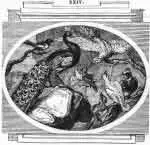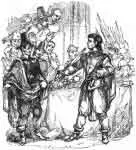The Birds decided to form a club. Each gave their qualifications in turn. The Kite felt he was best of all. The Birds fled from he who might be a tyrant.
Everyone is partial to themselves; worst is the tyrant.

Northcote
It once happened, that a select party of the feathered tribe determined to be very sociable, and form themselves into a Club, which was to be composed of a Kite, a Parrot, a Magpie, a Jay, a Mockbird, a Peacock, a Dove, and so on. When they were all met on a certain time, the discourse took the following turn. What quality or character was most to be coveted? and each ‘gave his opinion. The Parrot spoke first, and insisted upon it, that the power of mimicry demonstrated such a degree of nice observation of nature, so perfect a possession of the sense of hearing, so strong and retentive a memory, as evidently to proclaim a superiority of capacity in the possessors of that amusing faculty. He was backed in his arguments by the Jay, the Magpie, and the Mockbird. The Peacock spoke with great contempt of so mean and insignificant a talent, which amounted to nothing more than mere buffoonery, fit only to please the vulgar, and not to be compared by any means with personal beauty, a stately and majestic carriage, and a superb display of incomparably rich plumage, endowments of nature which gained immediate admiration and applause from every beholder, both high and low. The Dove now put forth her humble claim, modestly observing, that purity of manners, and an unostentatious and inoffensive discharge of all the duties of domestic life, with perfect innocence and love, were merits, perhaps, intrinsically of a superior order to those which had been mentioned by other worthy members of the Club. Several others also endeavoured to blazon forth their pretensions, till the Kite feeling in himself the consciousness of that power which could crush the whole company, and enraged at the paltry and partial claimants who set him at nought, flew upon them like a true despot, declaring that he would prove who amongst them possessed the best right to distinction and homage; and quickly dispersed the whole assembly in the utmost terror, for fear of becoming the prey of an inexorable and cruel tyrant.
Application
This Fable seems to point at that ridiculous partiality, which most men have to their own abilities or acquirements; and which is also to be perceived in whole bodies of men, to their several professions. The scholar thinks that all excellence is centered in a knowledge of the dead languages. The poet esteems nothing of value, that does not exemplify the powers of imagination. The soldier boasts of courage, as the greatest of all human qualities; and beauties consider themselves as the universal objects of adoration. The enthusiast in religion congratulates himself on the possession of more than this world has to bestow. The rich man despises others as needy beggars, if they have not money; whilst the tyrant drives them all before him, as his tools and play-things, making them wholly subservient to his lawless will. J. N.

